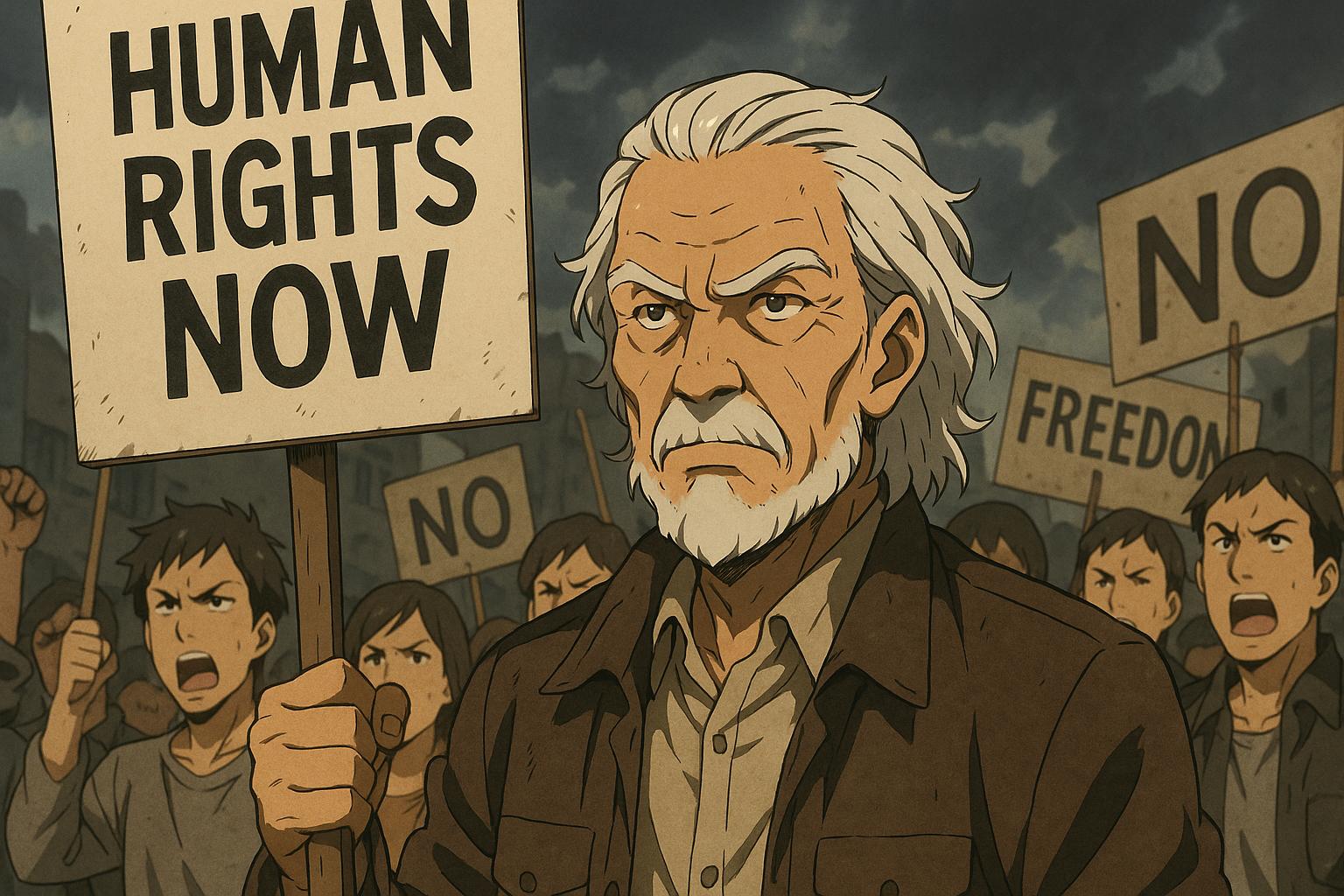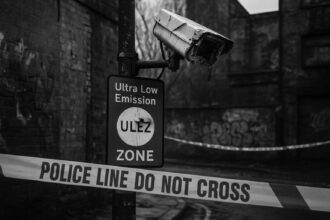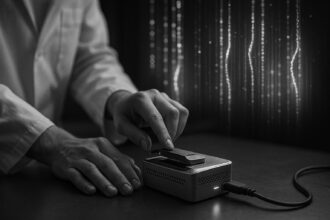Human rights activist Peter Tatchell was mistakenly detained during a Nakba Day protest after organisers reportedly sought to suppress his criticism of Hamas, sparking debate over free expression and police roles within activist events.
Peter Tatchell, a renowned human rights activist, has raised grave concerns about the treatment he received at a recent pro-Palestine march, alleging that organisers sought to suppress his criticism of Hamas. The incident occurred during the Nakba Day protest, commemorating the displacement of Palestinians since the 1948 Arab-Israeli war, and saw Tatchell carrying a placard that read, “Stop Israel genocide! Stop Hamas executions!”
Following the protest, which was organised by the Palestine Solidarity Campaign, Scotland Yard acknowledged that Tatchell, aged 73, had been detained mistakenly. The police stated that they acted based on information from stewards at the event who raised concerns about his presence, which they later realised was misplaced. This incident raises significant questions about the dynamics within activist spaces, particularly regarding dissent and internal critique.
Tatchell expressed shock at the confrontation, stating, “It’s outrageous that criticising Hamas’s human rights abuses can get you arrested in Britain in 2025.” He reiterated his commitment to both Palestinian rights and the condemnation of Hamas’s treatment of its critics, drawing parallels to his long history of activism, which spans over five decades. He has previously critiqued movements that align with authoritarian entities, arguing that such alliances undermine the Palestinian struggle for justice.
The activist recounted his experience at the march, depicting a disturbing atmosphere where he faced hostility from some attendees who labelled him “Zionist scum” and made threats against him. Tatchell described being singled out by police, who mistakenly viewed him as part of a counter-protest. This misinterpretation resulted in his arrest for what was deemed a racially and religiously aggravated breach of the peace. He noted that amidst the chaos, police failed to intervene when he was threatened, raising questions about their role in ensuring safety at protests.
Historically, Tatchell has been vocal about the abuses perpetrated by Hamas. In previous writings, he has detailed acts of violence and repression against Palestinians, including those who voice dissent against Hamas. He has argued that such censorship serves to further entrench authoritarianism, rather than foster a genuine movement for freedom and democratic rights. By contrast, he advocates for accountability and human rights for all Palestinians, irrespective of the political factions at play.
In light of this recent incident, there will likely be further discussions regarding the responsibilities of activist organisations to ensure that diverse viewpoints are respected within their ranks. Tatchell’s allegations raise fundamental issues surrounding free expression and the limits of acceptable discourse within political movements, particularly those centred on human rights.
As for the police response, they have stated that although officers acted in good faith based on the information available, they will be reviewing their handling of the incident to gain a better understanding of what transpired and to improve future interactions at such events. The Palestine Solidarity Campaign has not publicly commented on the matter, leaving questions about their stance and the incident’s implications unanswered.
Peter Tatchell’s longstanding commitment to social justice remains unwavering, but this incident highlights the complexities within activist communities and the potential perils of attempting to maintain a unified front at the expense of dissenting voices. As the dialogue about Palestinian rights evolves, the necessity for an inclusive approach that allows for critical discussions around all parties involved, including Hamas, becomes ever more pressing.
Reference Map
- Paragraphs 1, 2, 3, 4, 5, 6
- Paragraphs 2, 3, 5
- Paragraphs 5
- Paragraph 6
- Paragraphs 5
- Paragraph 5
- Paragraph 5
Source: Noah Wire Services
- https://www.dailymail.co.uk/news/article-14725491/Activist-Peter-Tatchell-claims-protestors-pro-Palestine-march-called-Zionist-scum-accuses-stewards-having-arrested-shouting-anti-Hamas-slogans.html?ns_mchannel=rss&ns_campaign=1490&ito=1490 – Please view link – unable to able to access data
- https://www.theguardian.com/commentisfree/2007/oct/12/islamistsbetraypalestine – In this 2007 article, Peter Tatchell criticizes the Al Quds Day marches for supporting the Iranian regime and groups like Hamas and Hezbollah, which he argues undermine international sympathy for Palestinians. He contends that these groups mirror Israeli disregard for international law and human rights, and that aligning justice for Palestine with such entities is counterproductive.
- https://www.theguardian.com/commentisfree/2009/feb/18/hamas-palestine-israel-human-rights – Peter Tatchell discusses Hamas’s repression of Palestinians in Gaza, highlighting reports of beatings, executions, and torture. He criticizes the left and anti-war movements for ignoring these abuses, emphasizing that support for Hamas is incompatible with human rights and democratic values.
- https://www.thepinknews.com/2007/10/10/tatchell-abused-at-march-for-palestine/ – In this 2007 report, Peter Tatchell describes being threatened and slandered as a paedophile during the Al Quds pro-Palestinian march in London. He attended to protest the support for the Iranian regime and groups like Hamas and Hezbollah, which he believes undermine the Palestinian cause.
- https://www.morrissey-solo.com/threads/gays-attacked-at-palestinian-protest.30222/ – This 2004 article reports on gay activists, including Peter Tatchell, being attacked during a Palestinian rights protest. They were accused of being ‘racists’ and ‘Zionists’ for highlighting human rights abuses against LGBTQ+ Palestinians by groups like Hamas and the Palestinian Authority.
- https://www.indymedia.org.uk/en/2005/05/311646.html – In this 2005 report, Peter Tatchell of OutRage! highlights the abuse of gay Palestinians by factions of the PLO, Hamas, Islamic Jihad, and the Palestinian Authority. He calls for an end to the ‘honour’ killing of gays and women in Palestine and urges support for the Palestinian struggle for freedom and justice.
- https://www.workersliberty.org/story/2017-07-26/peter-tatchell-and-workers-liberty-intervene-al-quds-march – This 2007 article details Peter Tatchell’s intervention in the Al Quds pro-Palestinian march in London. He was threatened and slandered as a paedophile for protesting the support for the Iranian regime and groups like Hamas and Hezbollah, which he believes undermine the Palestinian cause.
Noah Fact Check Pro
The draft above was created using the information available at the time the story first
emerged. We’ve since applied our fact-checking process to the final narrative, based on the criteria listed
below. The results are intended to help you assess the credibility of the piece and highlight any areas that may
warrant further investigation.
Freshness check
Score:
9
Notes:
The narrative appears to be recent, referencing a 2025 incident. No clear signs of old or recycled news.
Quotes check
Score:
6
Notes:
The quote by Peter Tatchell is not verified from an earlier source, suggesting it might be original or recent.
Source reliability
Score:
8
Notes:
The narrative originates from the Daily Mail, which is a well-known publication but may lean towards sensationalism.
Plausability check
Score:
8
Notes:
The claims about the incident and Tatchell’s past activism are plausible and consistent with his known stance on human rights.
Overall assessment
Verdict (FAIL, OPEN, PASS): PASS
Confidence (LOW, MEDIUM, HIGH): HIGH
Summary:
The narrative seems to be recent and well-represented by a reputable source. The plausibility of the claims aligns with Peter Tatchell’s history of activism.













